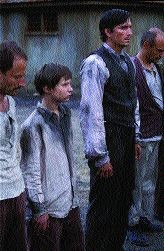Escaping

It is hard to be moved anymore by films about concentration camps. The grainy images of scarecrow figures; maniacal guards firing pistols on a whim; parents dragged away while children stare—Hollywood has managed to turn such horrors into stock visuals. It has made the unspeakable not only speakable, but almost rote.
I Am David may not break this mold, but it keeps us watching. It opens with a voiceover explaining to young David that a way has been made for him to escape from the concentration camp in Bulgaria. The electric fence will be turned off, a bag will be waiting with supplies. He is to make his way to Greece. From there he is to use his resourcefulness to find a way to Denmark and present a sealed letter to the authorities.
So David runs from border guards, scales some barbed wire fences and digs under others, hops a truck, dodges more police, shimmies up a rope to a barge, winds up in the open sea and swims ashore to Italy. Not bad for a pre-teen with only half a loaf of bread and a compass.
It is not hard to tell that the movie is adapted from a work of young adult fiction (a book by the same name by Anne Holm). This is not the kind of adventure story in which the bad guys eventually get justice, nor is it a coming-of-age story in which the protagonist grows up to avenge an earlier injustice. The child stays wide-eyed throughout. That is part of the film’s charm. Ben Tibber is believable as an industrious boy who takes on a Herculean task. Having grown up entirely in the camp, he does not know most things children his age should know—table manners, geography, how to pray. He gradually learns each.
At the climax of the film, David wanders into a church in Switzerland, drawn by the allure of almost otherworldly singing. He is met there by a uniformed guard, and is sure he is done for. Men in uniforms punish and kill. But this one is kind. Police in the West work on your behalf. This is Switzerland, not Bulgaria. David receives an epiphany—the world can be ordered, grownups can be nice, beauty does not have to involve danger.
Before we can enjoy this sweet, if trite, moral to the story, the movie ham-handedly drives it home. David reminds a grandmotherly stranger of the son she’d lost, as her care for him reminds him, in flashbacks, of the mother he lost. They weep, we don’t. In another flashback to the camp, we see David’s avuncular friend Johannes take responsibility for a petty misdeed of David’s and then get dispatched by the warden. (The friend is played by James Caviezel; the warden, by Hristo Shopov. On another film set under Mel Gibson’s direction these two played Jesus Christ and Pontius Pilate, respectively, which means Caviezel suffered a vicarious death for others at the hands of Shopov twice in 2004. What were the odds?)
Of course, we want a happy ending. We want the combined power of friendly strangers and individual savvy to allow a child to claw his way to freedom. But this seems a misleading way to end a story that begins in a communist gulag.
The film’s emotional climax is even more untrustworthy. The grandmother figure explains that the guards who beat and kill are human too, with families and friends. The movie presses this point home with the news that the camp’s warden (and Johannes’s murderer) is the one who helped David escape. This commandant has a heart.
It is true that the guards at concentration camps were people like us, with friends and families, and with the capacity for goodness. Yet that fact may make them all the more terrifying. Hannah Arendt famously chronicled the ordinariness of Nazi interior minister Adolf Eichmann, who did nothing worse than make sure the trains in Germany ran on time. His evasion of the question of what was on those trains, or what destination they sped toward, belied his otherwise ordinary decency. His evil was all the more disturbing for being so ordinary.
Some historical events can make us sigh and wonder if people aren’t basically good after all. But a story about a gulag and the effects of political repression cannot make us do that without being saccharine and dishonest. I Am David tells a story that is touching, as long as you don’t think about it too hard.





